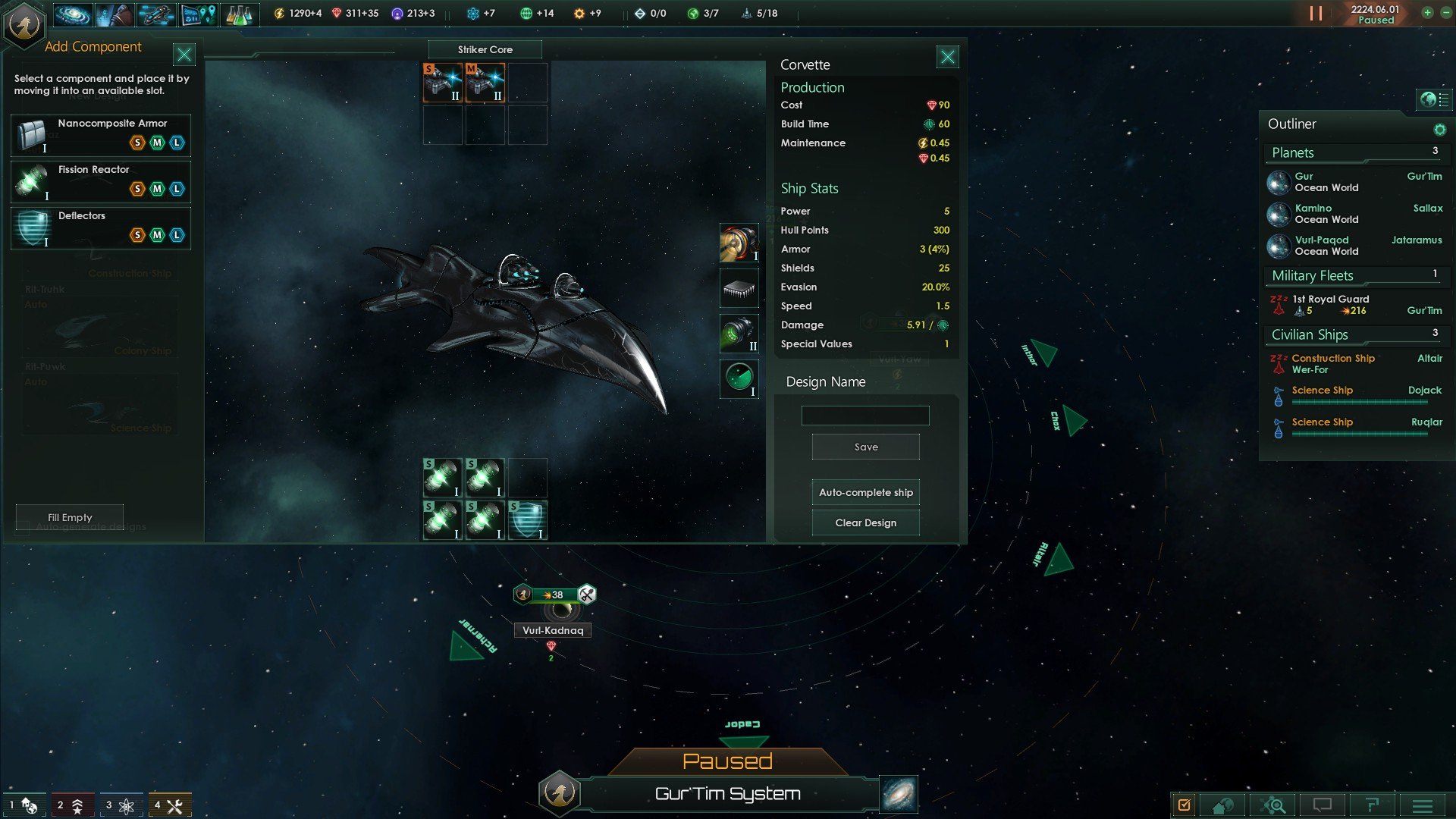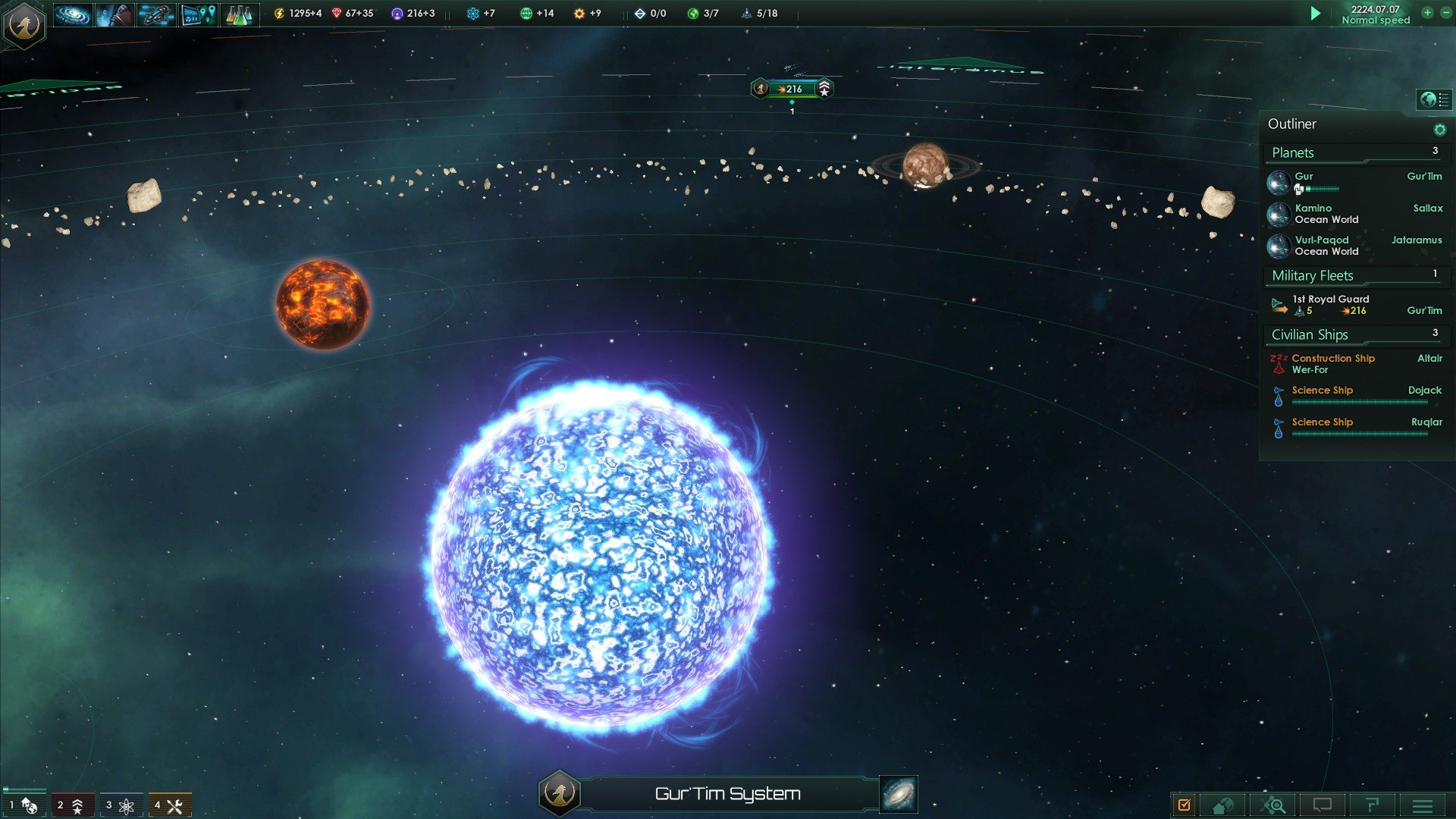
It's a fantastic time to be a space fan in gaming. There are a bunch of titles on the horizon, including Limit Theory and Star Citizen, not to mention current games like Elite Dangerous, Sins of a Solar Empire, and X3. I already have a few titles to experience different types of gameplay, but Paradox Interactive decided it was time yet another game was thrown into my Steam library. Enter Stellaris. My life has already left through the stage exit.
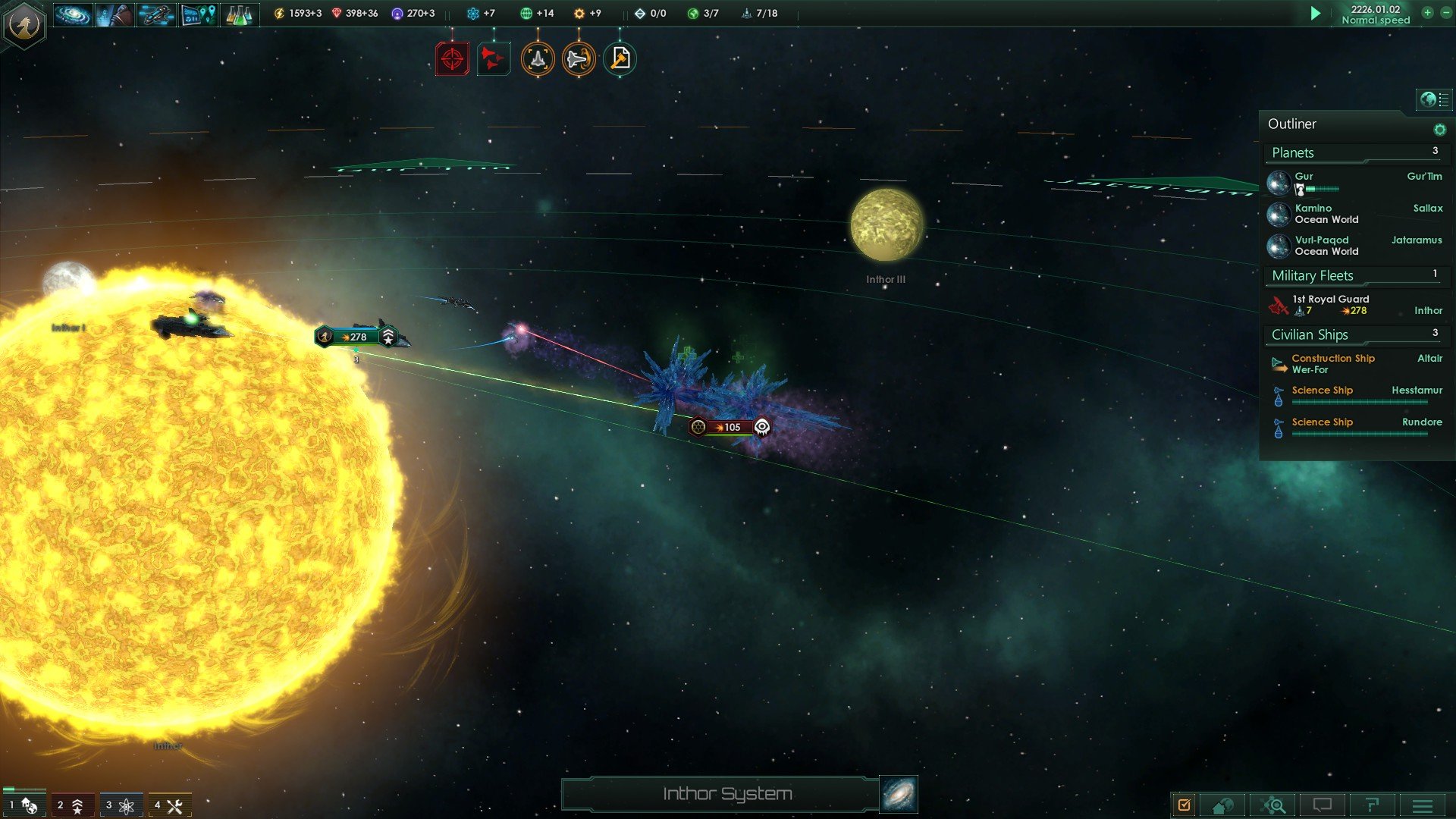
Stellaris is Paradox's attempt to create an immersive universe which will cater to different playstyles. Whether you prefer to go on all-out offenses and dominate whole star systems or enjoy playing it safe and forming alliances with equally passive races, there's potential in Stellaris to choose and act out your own battle plan, all whilst roleplaying to the maximum as the days pass by (both in-game and in reality).
I've already invested countless hours of my life to really get a feel for the different paths one can take. But you'll need many more playthroughs to feel as though you're repeating everything as there are many procedural aspects to the experience. And that's a good thing.
eXplore
The user interface in Stellaris is absolutely perfect. It really is among the best interfaces I've had the pleasure of interacting with in any video game. You have the incredibly handy Outliner on the right-hand side of the display, which provides quick and convenient access to a variety of properties. Then you have the gorgeous futuristic look of menus and interfaces. Everything here feels rather polished. I would like to be able to configure in-game pop-ups, however, as I'd prefer to be alerted and have the game paused when stuff happens. The game does do this with certain messages, but I'd like to have the ability to configure more.
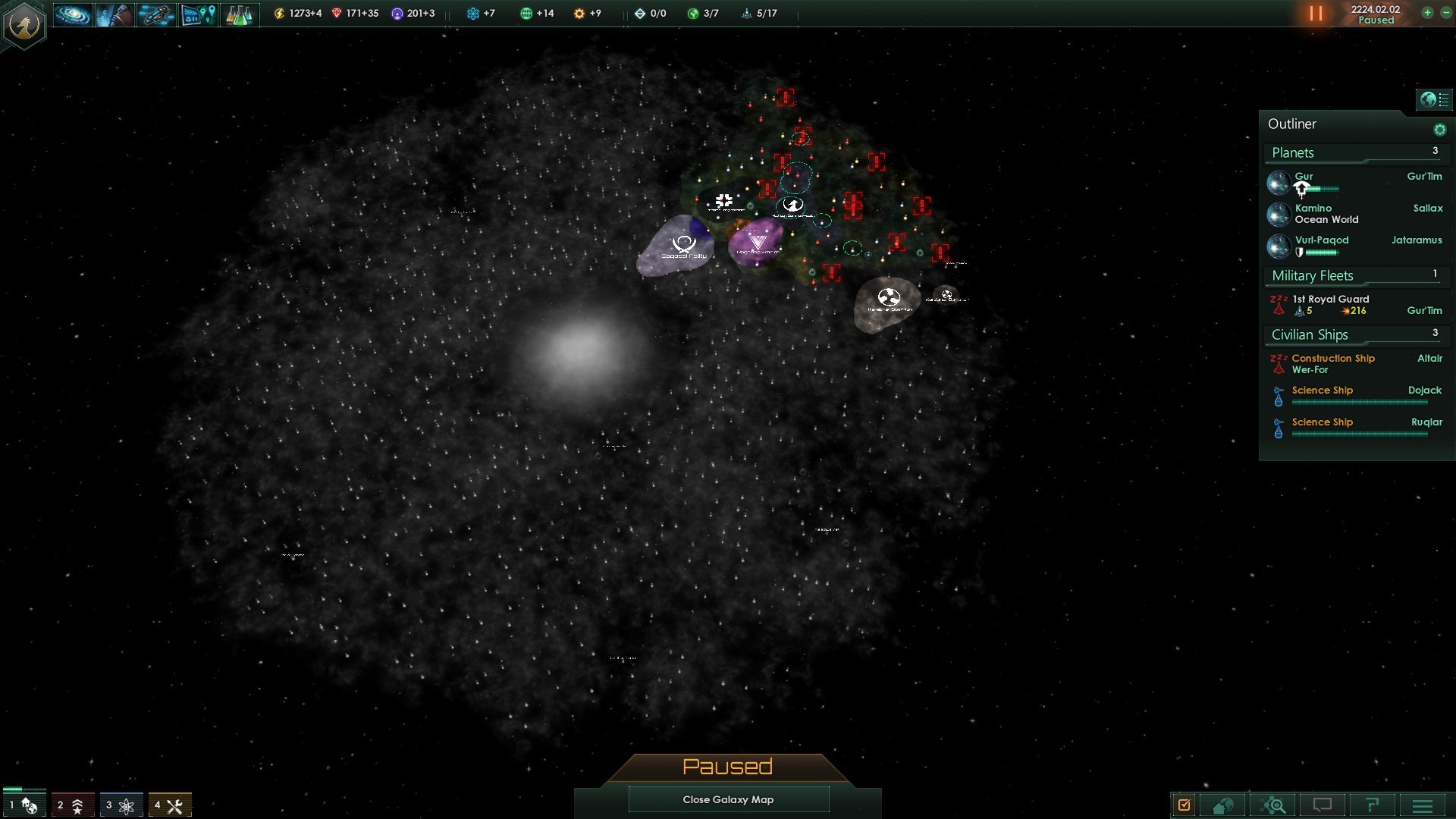
As for graphics, they're very good. Systems look amazing against the backdrop and the variety of ship designs available hold up when zoomed all the way in. Graphics don't need to be outstanding with these types of titles since you'll likely spend most of your time zoomed out or in the galaxy view, as opposed to lounging around in one of your systems.
System (computer, not star) requirements are fairly low, which opens up access to those who can't afford supercomputers, but you are able to turn everything all the way up should you have the system capabilities to do so. I'm glad Paradox hasn't gone overboard here, which could have caused havoc in games set on the largest-sized galaxy map with dozens of races all competing against one another.
Late game can tax your computer's hardware, but I didn't notice too much lag with an overclocked Intel Core i5 6600K processor. Scale your settings accordingly and you'll be absolutely fine (the minimum requirements are quite reasonable). As for the races themselves, Paradox has done a solid job fleshing out the selection of portraits and subsequent personalization according to selected traits. You can be a human, bird, fox, or even a mushroom.
eXpand
When starting a new game, you're provided with the option to configure game settings to your preferences (take note of potential performance hits with large maps and lots of species), as well as selecting a species to play as. This is one of my favorite parts of Stellaris — the ability to completely customize a species from the ground up. You'll be able to name them, select their preferred habitable worlds, choose species traits, ship design, initial leader, and how they'll react to other lifeforms.
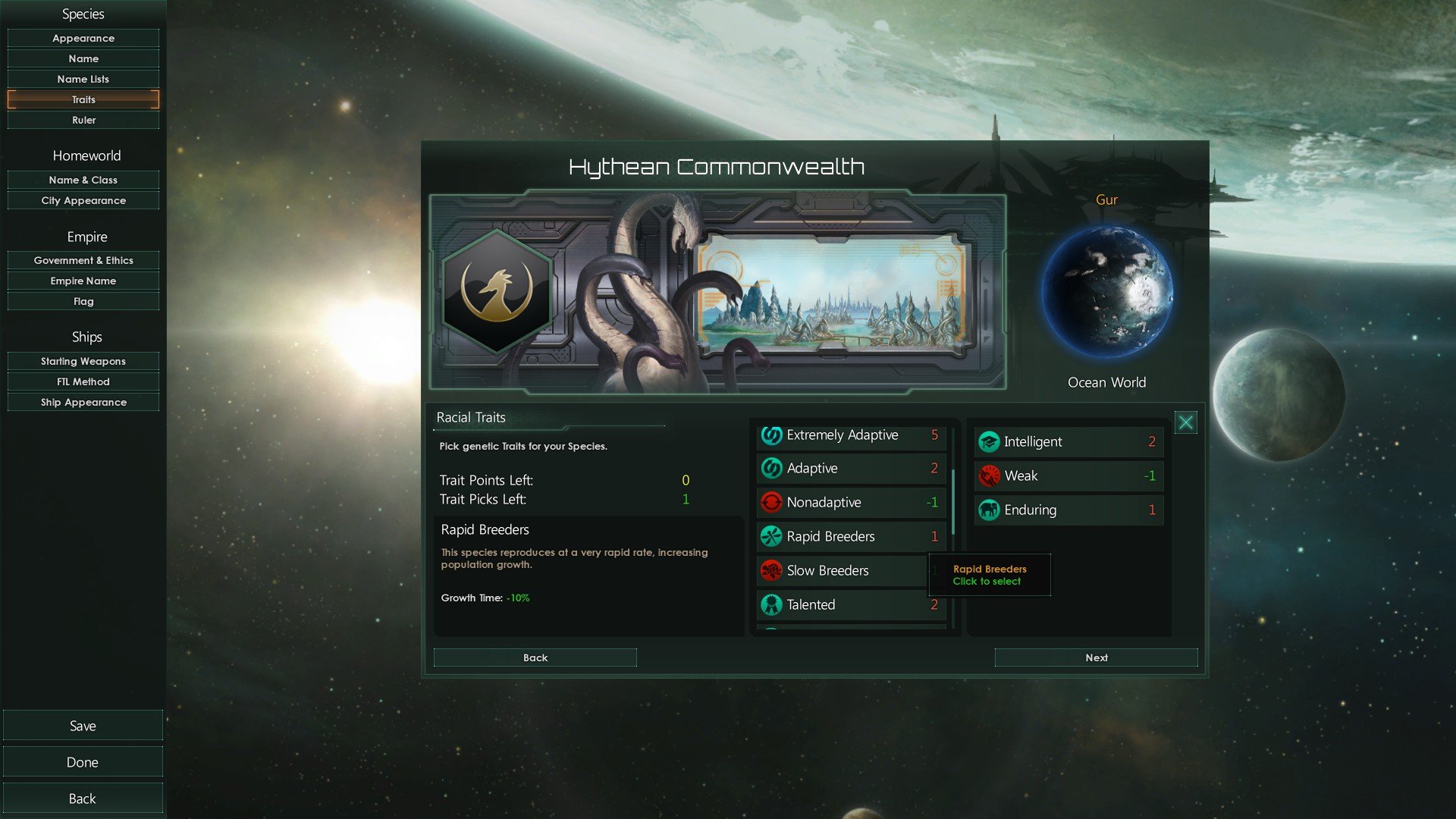
There is a vast array of options available that can be selected to take you down a different path. For example: opting to become xenophobes will alter in-game events, how you deal with other species as opposed to being xenophiles. It makes it easy for the player to try out something new without having to grind through early stages of the game. It also helps that everything is procedurally generated on load.
Once you have your species configured, you'll need to select your mode of transportation. Not ships, but a choice of FTL technology. There are three options: warp, hyperlanes, or wormholes. Space is a big place and depending on which option you opt for, your gameplay and how you approach situations alters drastically. The easiest option is warp, which allows you to travel essentially everywhere, but with drawbacks. The engines are expensive, and the further your ships travel, the more the FTL cooldown time is. (And you don't want to land in a system with angry lifeforms with no means of escape now do you?)
Wormholes are similar to warp drives, but instead, you rely on constructed wormhole stations on the outer edges of a star system. Ships using said stations experience instant travel between stars and don't need any modules equipped to do so. The downside is you'll need to erect new wormhole stations at the edge of your empire when you've visited all systems within the range of your initial station.
Lastly, there's hyperspace. A hidden network of highways connect stars across the galaxy but are only visible by those with capable drives. The network will offer your ships quick travel, but you'll be relying on them and will have to route through predefined lanes to get to specific systems. You'll have less freedom as to how you'll get to your destination, but it's cheap and cheerful. And you can always shout "Engage Hyperdrive!" as your fleet charges up.
There are a few important things you'll need to keep an eye on. Stellaris is what's called a 4X strategic title, meaning it combines elements of classic 4X gameplay — eXplore, eXpand, eXploit, and eXterminate — with strategic elements like managing the resources, armies, fleet, planets, systems and stations under your control. For resources, Stellaris keeps things simple with just three. Energy and Minerals are used to construct, upkeep and advance your civilization, while Influence is a political clout used for edicts, recruiting leaders and more. The former two can be mined across the galaxy, much like the three research resources.
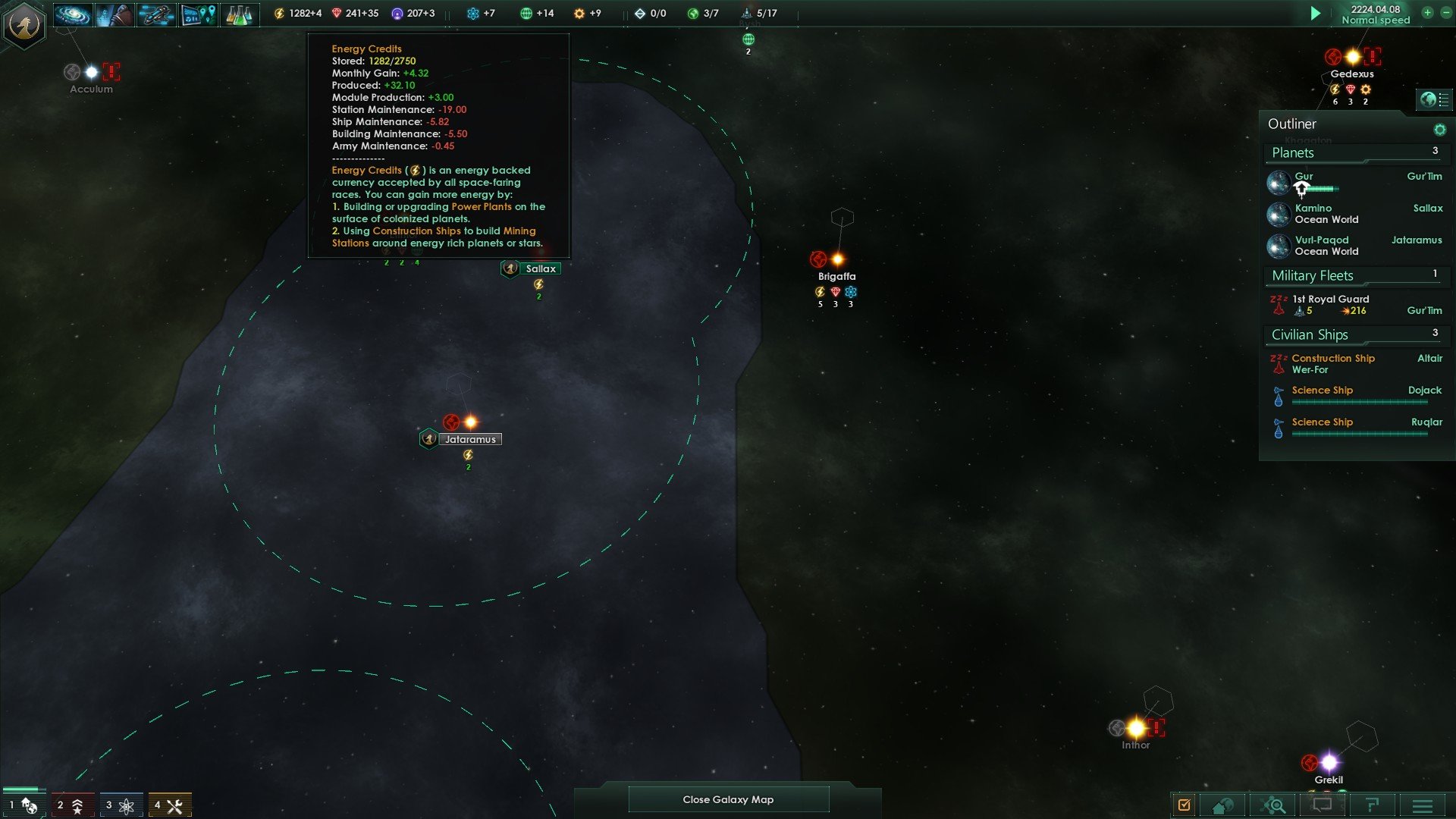
Speaking of research, Stellaris has three tech trees that run simultaneously: Physics, Society, and Engineering. You'll be researching three technologies at a time, but since this is Paradox and Stellaris, you'll only have a choice of three on each department at any single time, and these are randomly selected. Don't worry, though, you'll not be provided with late-game tech immediately, nor will the game prevent you from accessing the absolute essential advances from the get-go. You'll see the same tech in different playthroughs, but mostly at different intervals.
Excitingly, science plays a massive role in the development and expansion of your newly founded galactic empire. Specifically, the science ships. These vessels serve as both scouts to survey systems and locate valuable resources, as well as discovering anomalies that may appear throughout their travels. You'll be unlocking new missions, carrying out reconnaissance and even unraveling prehistoric mysteries. The events are a welcome break from empire management and help break things up.
These event chains represent the choices you'll have to make in Stellaris. Outcomes will be different depending on options you select as you discover and complete new missions. It's an interesting way to implement some storytelling within the 4X experience. You'll have late-game events to look forward to as well. These potentially game-changing occurrences are generated at random and can tear alliances apart and destroy empires. You can prevent these big events from taking place, but sometimes there's that slight bit of amazement at watching the absolute carnage unfold in front of you.
That's what makes Stellaris so appealing. You're not only able to charge through as you would in any other 4X or strategy game, with all guns blazing and asking questions after everyone else is killed off. It's also possible to really immerse yourself into the galaxy and take new paths you would never have even considered possible, exploring the unknown with random events that can completely change the course of your empire.
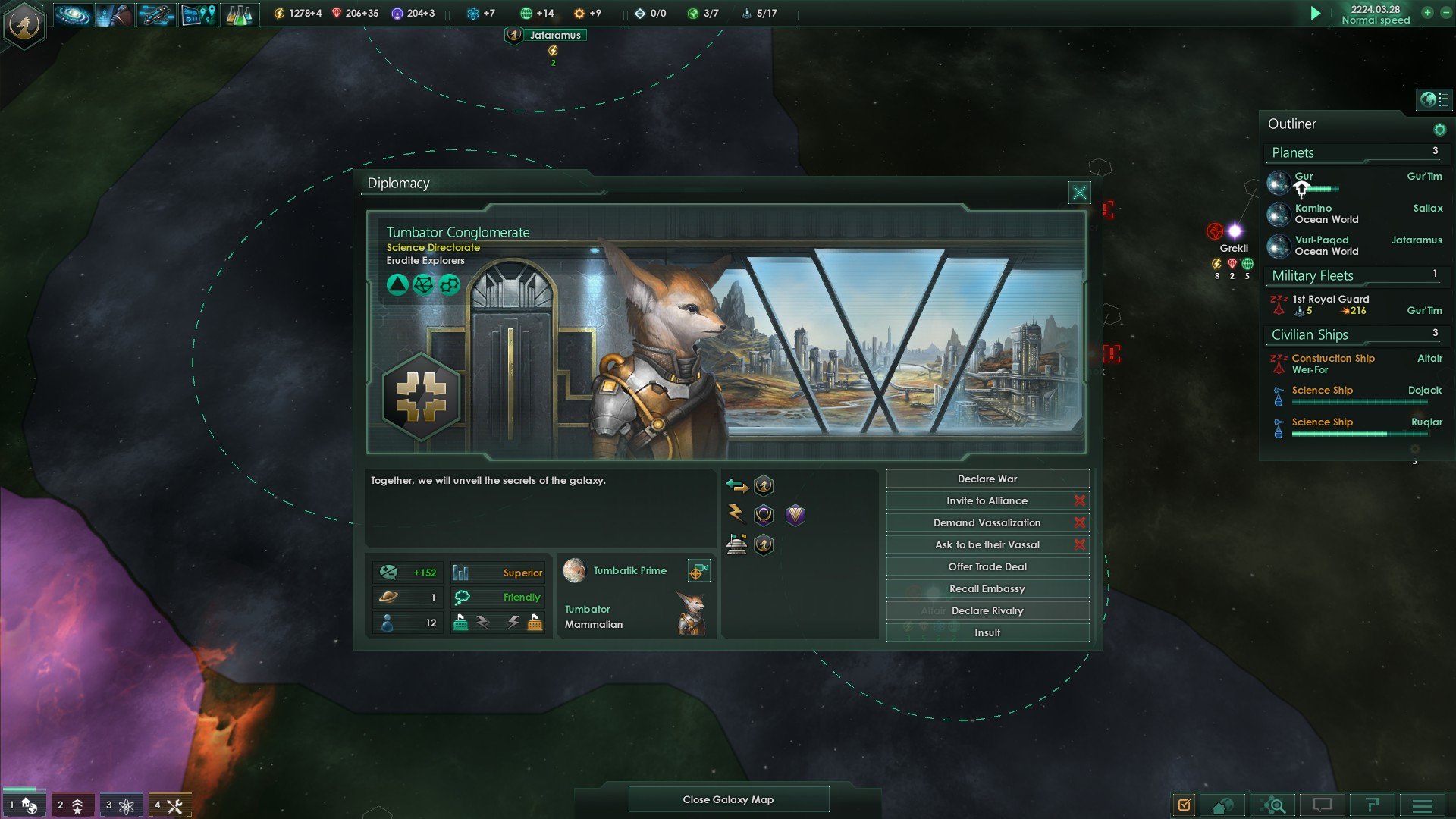
When not freaking out about what may be located in the next system, you can rename pretty much everything. From ships to planets, stations to entire systems. Fear not, British public, as I named my flagship cruiser Boaty McBoatface. The dream lives on in space.
eXploit
Each fleet you form, science vessel you send out and each planet you hold will require a leader to govern and advance. These special characters gain experience and level up over time and through in-game events/actions, further enhancing applied bonuses. But as with everything, they age and have a risk of passing away, forcing you to alter things and recruit a replacement. It's actually quite simple but effective, which is a theme found throughout Stellaris.
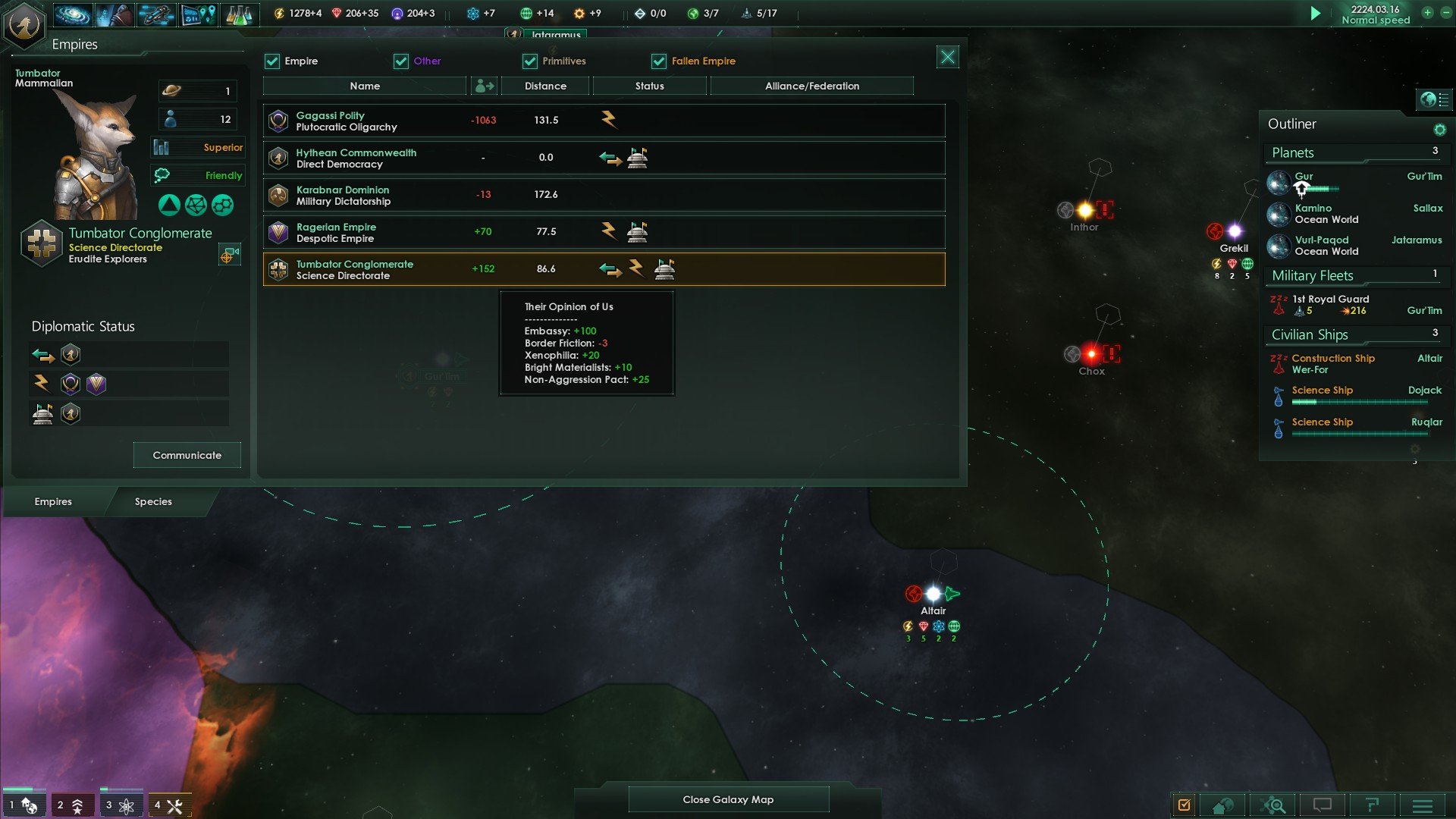
Diplomacy will see you form treaties, declare wars and even form different alliances with your neighbors and distant species. You're able to see both positives and negatives of any given relationship, as well as select options to improve (or shatter) treaties already in place. It helps you work alongside friends and go to war with adversaries, but I'd like to see some more options available with regard to possible trade relations (more than just swapping resources, maps, and stuff) that benefit two species over time. It feels as though this part of the game could be fleshed out some more. Things take a slight dip when we actually get down to combat.
Like everything else in the game, combat is straightforward, compact and legible. During fights, there's a neat window and shows enough information about ships in battle (both your own, allied fleet and enemies) without overloading your screen. If there's just one thing I have to poke at, it would be the military strength. I understand where Paradox was going with this combined number, but it can lead to situations where you can lose fights when you have vastly higher military strength, simply due to the fact that your fleet consists of 15 ships while the enemy only has 1.
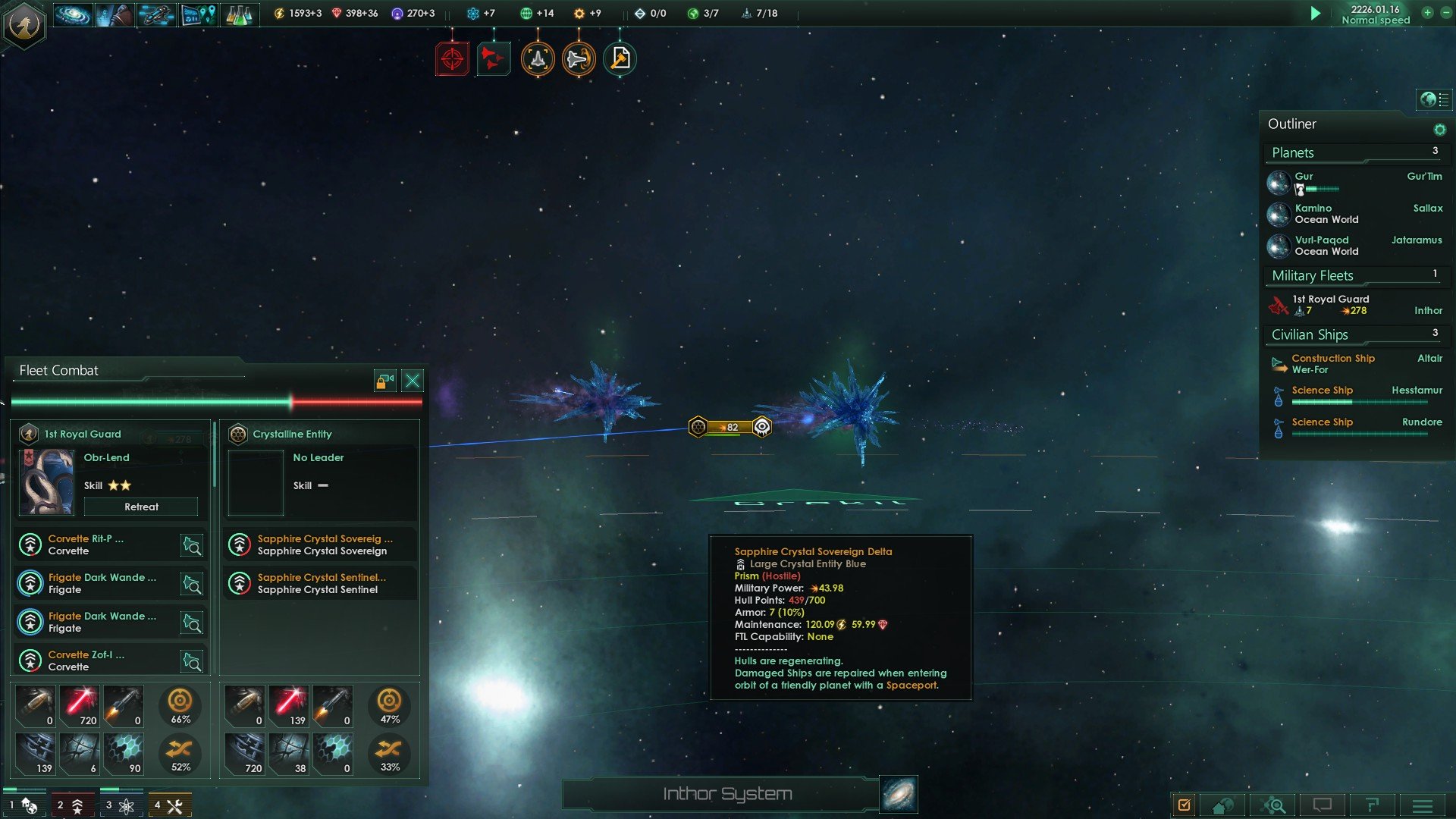
Your fleet will start to drop in military strength as you lose ships (due to them being weaker individually) while the enemy vessel will maintain its rating throughout the fight and could end up turning things around. There are a number of factors in battles, including speed, weaponry, evasion, and bonuses that could turn the tide of battle, but these numbers appear to not be reflective of said elements. Simply put: don't rely on military strength numbers. They're a handy indication as to whether you're likely to be spanked in a vacuum, but you have no guarantee of a win simply because you have a rating of 1.6K and they are sitting at 800.
A possible fix is for said rating to drop per ship depending on amount of hull damage received. Some food for thought.
Even if you're a complete noob when it comes to 4X games, Paradox has done a stellar job with the in-game tutorial.
Luckily this is offset by the ship design feature that is fun to use. You'll be able to design and create ship templates, which your various starports can then use to pump out some manpower. Adding specific mount options, upgrading internals with advances made in research all helps to improve your chance of winning violent encounters. Combining this handy system with diplomatic relations, roleplaying and taking things slow can ensure combat is less of a luck-driven military strength test and more of actual dominance.
But don't let all this talk of combat, diplomacy, resource management, scientific research and exploration scare you away from giving Stellaris and the genre a try. Even if you're a complete noob when it comes to 4X games, Paradox has done a stellar job with the in-game tutorial. There's a slight learning curve, but once you've got through numerous years and have absorbed everything your trusty AI can help you with, you should be all set to advance and conquer.
Paradox has also made sure both players and the modding community is aware of available tools and support for additional custom content. I'm fairly excited to see just what talented individuals will publish on the Steam Workshop, which will only add value and yet more replayability to the title.
The best part about this game is your destination is entirely down to you, Stellaris will simply help you get there.
eXterminate
I've praised Stellaris throughout, but it isn't a perfect game. It has some areas where improvements can certainly be made. I expect to see some issues I've outlined above addressed in upcoming patches, not to mention DLC that is surely planned for the game. That said, Stellaris scratches an itch I've had for some time, and it does so spectacularly. Overlooking some of the nagging issues, I can safely say that Stellaris is the best 4X space title I've played to-date.
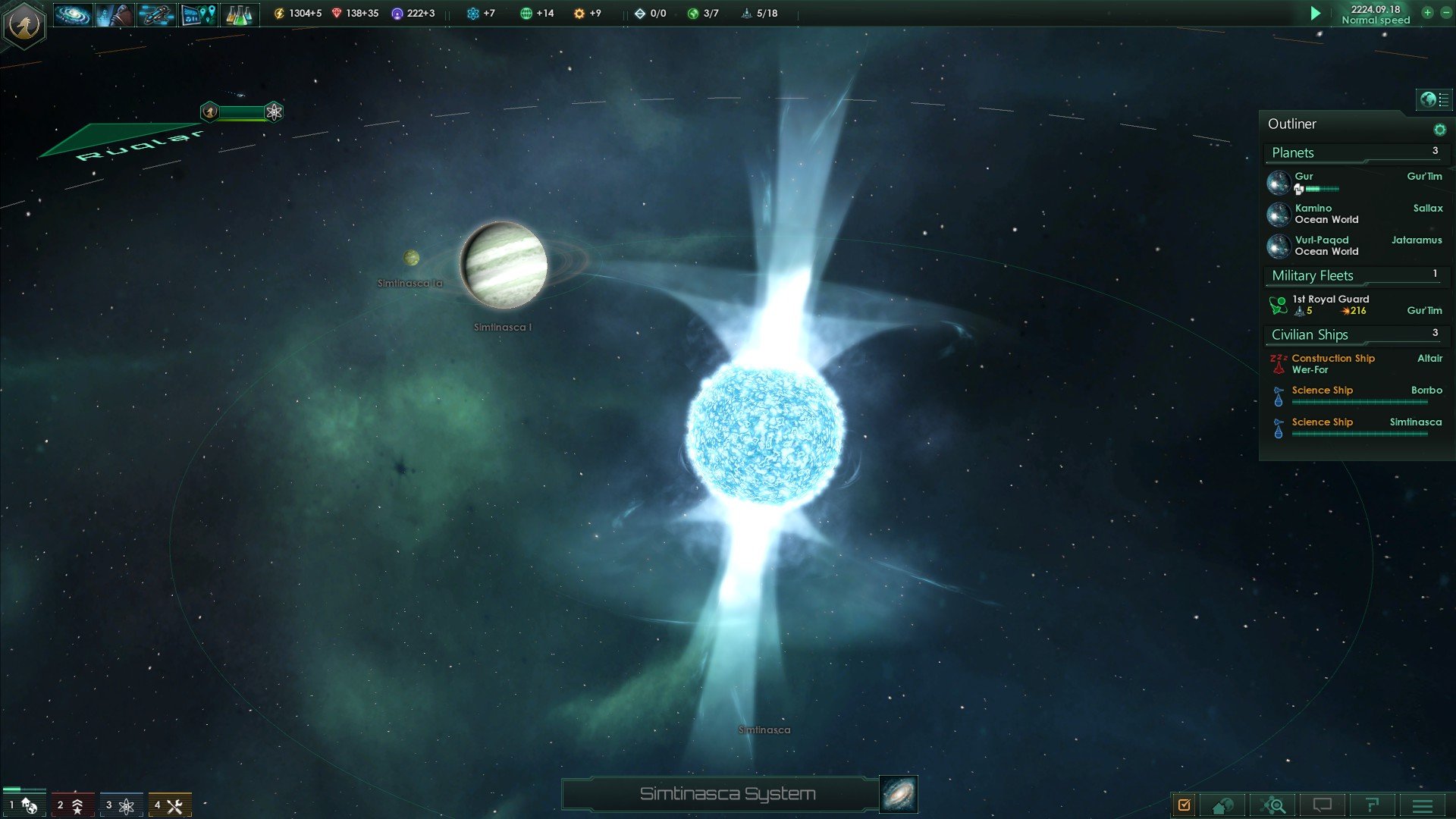
So, should you buy Stellaris? I'm never one to recommend games simply due to everyone having their own particular tastes. It also doesn't help that Stellaris really is quite the niche title (though the genre is certainly picking up steam). Do you like space games? If so, do you like strategy and empire management titles? Still rocking the yes vote? The buy Stellaris now. It's difficult to pick faults with the game, so take the two negative points below lightly. They're minor issues that may not even appear on your radar.
Now, if you'll excuse me, I need to attend to my xenophobic race of sex-driven, battle-hungry mushroom people.
Pros:
- Incredible 4X strategic gameplay
- Superb levels of replayability
- Fully support modding community
- Immersive roleplaying
Cons:
- Feels a little too simple in places
- Military strength ratings don't translate directly into battle outcomes
This review was conducted on a Windows 10 PC with an Intel Core i5 6600K processor overclocked to 4.8GHz and 16GB DDR4 RAM with an ASUS AMD Radeon R7 265 graphics card with 2GB VRAM, playing a game copy purchased by the writer.

Rich Edmonds was formerly a Senior Editor of PC hardware at Windows Central, covering everything related to PC components and NAS. He's been involved in technology for more than a decade and knows a thing or two about the magic inside a PC chassis. You can follow him on Twitter at @RichEdmonds.
